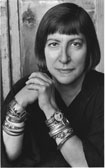


S. J. Rozan: telling everyone's story
Excerpts from the interview by Chris Aldrich in the October/November 2004 issue of Mystery News
It’s been a long wait for a new novel from S. J. Rozan. Her eighth book in the Lydia Chin/Bill Smith series, Winter and Night, came out more than two years ago, and was quickly acclaimed as her best yet. Winter and Night garnered starred reviews from Kirkus and Booklist…and Edgar and Macavity Awards for Best Novel. For those of us who have been fans for years, the wait for another book has been altogether too long... but definitely worth it.
Now Rozan is back with Absent Friends, an emotional tapestry of a novel set in the aftermath of the September 11th attacks that has as its core a group of New Yorkers whose lives have been intertwined since their carefree childhood in the insular – and aptly-named –Staten Island neighborhood of Pleasant Hills...
SJ Rozan and I talked only a few days before the third anniversary of 9/11.
CA: Absent Friends is such a departure from what you’ve done before. I never would have predicted this when I first interviewed you seven years ago. How did you come to write this book?
SJR: 9/11 called for a different response. The first response everybody had was why would I write? The only thing that anybody wrote for two months was emails to other people asking are you writing. Eventually people came back to the idea that we’re writers – it’s what we do. The problem with writing in an event like this is that fiction writing requires a narrative, it requires a story. Other artists who were also paralyzed immediately -- poets, painters, dancers, musicians, everyone I knew….those arts don’t have narrative content so you can respond emotionally without finding a story. We can’t. You have to pin your emotions on a story framework and the problem was to find a story that could deal with this unprecedented enormously emotional situation without being overwhelmed by it or making it trivial. And that was a huge, huge problem, even after people decided to go back to writing. And a lot of people wrote historicals – books set before this happened. Another response was to write something timeless – in the sense that it could have happened anytime, like medical thrillers...
Having started with the boys and girls in 1976, I started going back into their childhood because part of what I was saying in this book is that you are who you always were – you are who your childhood made you.
CA: This is one book where you can see that everything comes from character…
SJR: …and that they helped form each other’s characters but in some ways you are who you were born to be and if you fight that it’s a problem. I told these stories as a way to tell everybody’s story. What I was telling was the story of New York…the story of who we were and what happened...
Read the complete interview in the October/November 2004 issue of Mystery News